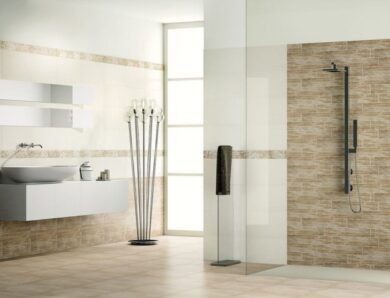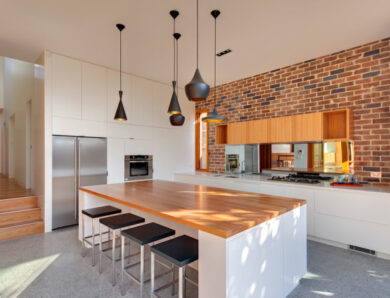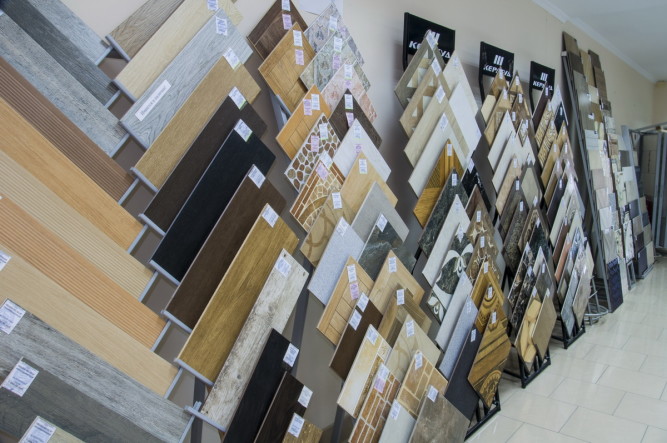Types of floor tiles: how to choose for the kitchen and hallway
An incredible range of floor coverings is available in the market of finishing goods. This category has a number of certain characteristics.
differences in materials
If you compare floor tiles with ordinary tiles, it is worth paying attention, that its thickness is slightly greater. The advantages are the characteristics of wear resistance and strength.
Since most often you need to choose floor tiles in the hallway and kitchen, another criterion should be considered. It's about dimensions. In addition to greater thickness, it is necessary to take into account the width and length of the elements. Mostly standard kitchens use medium-sized squares. But for a narrow corridor, this option is not suitable. In other words, take into account the available area for processing and choose the optimal ratio of the size of the cladding.
Porcelain is a durable coating
Basic selection criteria
To choose the right floor tiles for the kitchen or hallway, consider the main criteria, and then make a decision. These include visual and technical performance. If with the first all is more or less clear, the second needs to be analyzed.
One of the most important indicators is the strength of the material. Example, in the kitchen you missed the cutlery. Poor quality coating may not withstand the impact - it will remain cracks and chips. Find out the wear resistance class. The coating must resist abrasion, minor mechanical damage, fading and other negative factors.
There are 5 wear resistance classes:
- Vulnerable category, suitable for infrequent operation and walking without shoes;
- It is used in non-residential premises of private houses;
- Suitable for frequent use rooms;
- This is a category of tiles for public places;
- Abrasion resistant, used in production.
Compliance with the wear resistance class of the room type
The third category is suitable for a hall or kitchen. This tile is strong and moderately rough. It is worth considering, that this classification applies mainly to tiles.
exept this, when buying a floor covering, pay attention to the following characteristics:
- Moisture resistance. For rooms like bathrooms, kitchens and hallways are sure to choose the material, which is impermeable to water and does not break down under the influence of humidity.
- Frost resistance. It is relevant in private homes. Floors can freeze, and therefore it is better to choose a product of the increased category of frost resistance.
- Porosity. Prefer dense tiles.
- Hardness. Affects tactile sensations, noise absorption and reduces the risk of beating dishes when falling.
- Thickness. When installing the coating, part of the height is stolen. Keep this in mind when deriving the threshold level.
- Additional features. Example, installation of a heat-insulated floor. Not all coatings allow this.
materials
Solving issues, which tile to choose for the floor in the kitchen or hallway, consider all possible coverage, as well as their distinctive characteristics. There are the following categories:
- Ceramics. Suitable for the kitchen, but for rooms with more intense load it is better to look for other covering. Made of clay raw materials. According to the strength is divided into classes. The thinner and porosity, the lower its performance.
- Porcelain. This is one of the strongest facing materials. Differs in hardness and density. The porosity is reduced to zero, therefore it is waterproof, frost-resistant and fire-resistant. The secret of its origin lies in the addition of granite crumbs to the ceramic charge and baking technology. The design differs in its realism and the ability to mimic natural materials with detail.
- Stone. Granite and marble are used here due to their strength and decorativeness. But the cost of coating this stone is high, therefore, this material remains the privilege of wealthy people. Instead, choose a similar texture of artificial porcelain.
- Concrete. The mixture is based on cement and sand. It is used at creation of street paths and platforms. The quality of the product depends on the specific composition of the mass and method of manufacture: casting or pressing.
- Pvc. This tile is used to line the floor of the corridor. It is thin and soft. Laying requires careful leveling of the surface. Flexible coating resists shocks and abrasions.
- Cork. Non-standard variant of floor facing. This is a natural material, although its artificial substitutes are also sold today. Muffles sounds and retains heat. At intensive operation the covering can be deformed. Not suitable for rooms with high humidity.
Varieties of tiles depending on the material of manufacture
Design
A light floor will be a smart solution for the kitchen. Blurred textures and ripples are popular. Dirt and water splashes are less noticeable on such a surface. Or choose a shade for the headset, apron, table top.
Styles and design
In the corridor, as in the kitchen, a winning option would be to mask possible contamination. Use the usual imitation of stone, wood texture or leather. Monochromatic tiles are best left for the bathroom and toilet.
To expand the space, diagonal layout will suit. The simplest is the seam-to-seam scheme for squares. But place the rectangles in a runaway or Christmas tree, depending on their size.
Finally, we are looking for a suitable grout. For color models, the standard white and beige range is suitable. To imitate wood, choose the appropriate shade. This surface will delight you with an expensive and neat appearance. And proper care and timely repair will extend its service life for many years.



